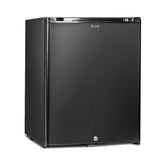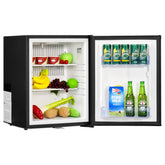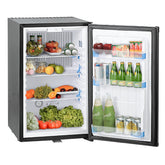Unveiling the Power of Gas: All About Gas Refrigerators
For most Europeans, the idea of a refrigerator likely conjures up images of a sleek, humming appliance plugged into the wall. But did you know there's another option – the gas refrigerator? While not as common as its electric counterpart, gas refrigerators offer unique benefits and can be a valuable choice for certain situations.
What is a Gas Refrigerator?
Unlike electric refrigerators that use electricity to power a compressor, gas refrigerators utilize a sealed absorption system. This system relies on a heat source, typically propane or natural gas, and a chemical called ammonia to create a continuous cooling cycle. Here's a breakdown of the process:
1. Heat Application: The gas burner heats a solution of ammonia and water in the generator.
2. Ammonia Separation: As the solution boils, ammonia gas separates and rises, leaving water behind in the separator.
3. Condensation: The ammonia gas travels to the condenser, where it cools and condenses back into liquid ammonia.
4. Evaporation and Cooling: The liquid ammonia flows to the evaporator. Here, it mixes with hydrogen gas (already present) and absorbs heat from the refrigerator compartment, causing it to evaporate. This evaporation process creates the cool temperature inside the refrigerator.
5. Absorption: The ammonia and hydrogen gas mixture then travels to the absorber, where it encounters the water separated earlier. The water readily absorbs ammonia, separating it from the hydrogen gas.
6. Cycle Repeats: The separated hydrogen gas returns to the evaporator, while the ammonia-water solution flows back to the generator, ready to repeat the cycle.

Advantages of Gas Refrigerators:
· Off-Grid Functionality: A major advantage of gas refrigerators is their ability to operate without electricity. This makes them ideal for remote locations, cabins, or for those who want a backup cooling solution in case of power outages.
· Quiet Operation: Gas refrigerators have no compressor, making them significantly quieter than electric models. This can be a major benefit for those who appreciate a peaceful kitchen environment.
· Durability and Reliability: The simpler design of gas refrigerators, with fewer moving parts, contributes to their reputation for durability and reliability.
· Environmentally Friendly: While some older gas refrigerators used harmful refrigerants, modern models utilize eco-friendly options like ammonia, which has a minimal environmental impact.
Considerations for Gas Refrigerators:
· Fuel Source: Gas refrigerators require a constant supply of propane or natural gas to function. Ensure you have a reliable gas connection or readily available propane tanks.
· Initial Cost: Generally, gas refrigerators have a higher upfront cost compared to electric models.
· Temperature Fluctuations: Due to the use of an open flame, gas refrigerators might experience slightly more temperature fluctuation than electric models.
· Maintenance: While generally reliable, gas refrigerators require periodic maintenance to ensure optimal performance.
Who Should Consider a Gas Refrigerator?
· Off-the-Grid Living: If you live in a remote location without access to electricity, a gas refrigerator offers a dependable solution for food storage.
· Frequent Power Outages: For those who experience frequent power outages, a gas refrigerator provides peace of mind, knowing your food will stay fresh even during an outage.
· RV Owners: Gas refrigerators are a popular choice for RVs due to their off-grid functionality and quiet operation.

SMAD and Gas Refrigerators:
At SMAD, we understand the diverse needs of our European customers. While we offer a wide range of high-quality electric refrigerators, for those seeking a reliable off-grid solution, we may also carry a selection of gas refrigerators. Be sure to explore our website or visit your local SMAD store to learn more about the specific gas refrigerator models we offer and see if one might be the perfect fit for your home.
Remember, gas refrigerators offer a unique advantage for those seeking an alternative to traditional electric models. By considering your specific needs and lifestyle, you can determine if a gas refrigerator is the right choice for you.












Leave a comment
Please note, comments need to be approved before they are published.